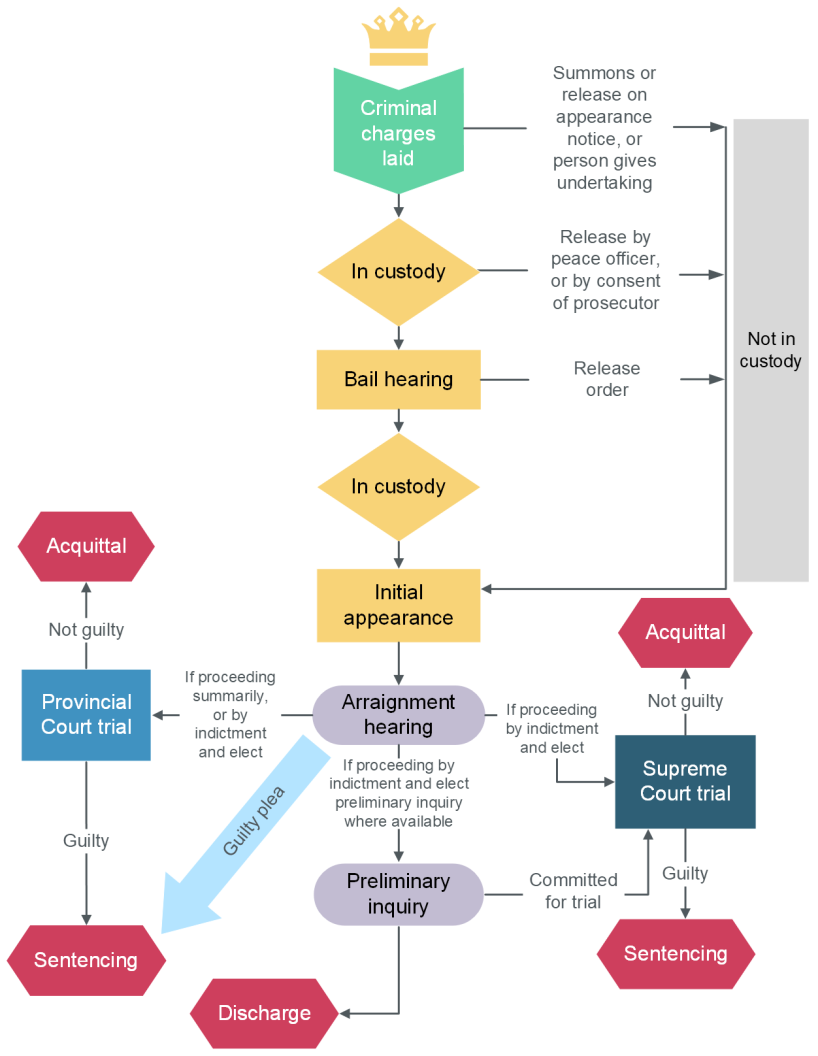Steps in a criminal case
Step-by-step overview of each stage of a criminal case and basic information about the criminal charge process, types of criminal offences and where criminal trials are held.
Overview of criminal prosecutions from beginning to end
The Criminal Code<p><span lang="EN-US">Criminal Code of Canada (CCC)</span><span lang="EN-US"> is the federal law that applies across Canada and sets out criminal offences, sentences and how a criminal case proceeds. A judge must follow the law in the </span><span lang="EN-US">Criminal Code</span><span lang="EN-US">.</span><span> </span></p> of Canada sets out the steps in criminal cases which are summarized in the diagram below.

The Court is not involved in all of these steps. For example, the Court is not involved in the process of laying charges.
The steps in a criminal case that happen in Provincial Court are briefly summarized below. There is more detail about each step in the linked pages. You can also navigate through the steps using the navigation links in the sidebar (or at the top of the page on mobile).
Bail hearing
If the accused person was kept in custody after being charged, the bail<p><span lang="EN-US">An order made by a judicial justice or a judge releasing an accused person from jail until their trial and requiring them to obey certain conditions (rules) and return to court on a specific date. The legal term for bail is “judicial interim release”.</span><span> </span></p> hearing is where the Court decides whether they should be granted bail (released with or without conditions) or kept in custody until the trial.
Initial appearance
At the initial appearance<p>Sometimes called a first appearance. When an accused person attends court and a judicial case manager, justice of the peace, or judge tells them what offence or offences they are charged with.</p>, the Court tells the accused person what they are charged with.
Arraignment hearing
An arraignment<p><span lang="EN-US">A hearing where the criminal charge against the defendant is formally read to them. The accused person states whether they will plead guilty or not guilty and in some cases, whether they request a preliminary hearing. What happens at an arraignment hearing depends on the type of criminal offence the defendant is charged with. </span><span> </span></p> hearing is a court hearing where the accused person or their lawyer tells the Court if they will plead guilty or not guilty<p><span lang="EN-US">An accused person makes a “not guilty” plea at an arraignment hearing when they do not admit committing the offence. In a trial, when the prosecutor cannot prove beyond a reasonable doubt that a person committed an offence, the judge or judicial justice must find them “not guilty”.</span><span> </span></p>. If the accused person is charged with an indictable offence, some procedural choices are also made at the arraignment hearing.
Preliminary inquiry hearing
In cases where the trial will be held in BC Supreme Court, there may be a preliminary inquiry in Provincial Court to decide if there is enough evidence for the trial to proceed.
Criminal pre-trial conference
In some cases, there is a mandatory pre-trial conference<p>A meeting where the parties discuss with a judge what is needed to be ready for trial.</p> for criminal files to ensure only those requiring a trial are set for trial and to ensure there are accurate trial time estimates.
Pleading guilty
A guilty plea<p><span lang="EN-US">The statement an accused person makes in court when asked if they are guilty or not guilty of committing a crime.</span><span> </span></p> means that you accept responsibility for the offence charged resulting in a conviction being entered and, if this occurs before trial, you will not have a trial. If you enter a guilty plea the next step is sentencing by a judge.
Provincial Court trial
This is the process where the Court decides if the accused person is innocent or guilty.
Sentencing
If someone pleads guilty to a criminal charge or is found guilty after a trial, there will be a sentencing hearing<p><span lang="EN-US">A court hearing where a judge hears submissions from prosecution and defence lawyers about how the offender should be sentenced.</span><span> </span></p> where the judge will read and explain the sentence<p><span lang="EN-US">A court order setting out the consequences of being convicted of a crime. Sentences may include fines, community supervision or jail. </span><span> </span></p>.
This page was printed from:
https://provincialcourt.bc.ca/navigating-court-case/criminal-adult-and-youth/steps-criminal-case
